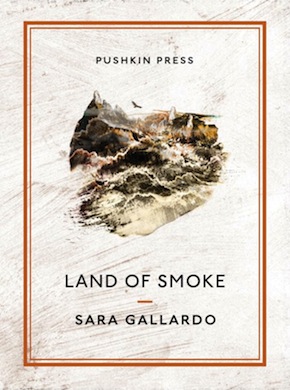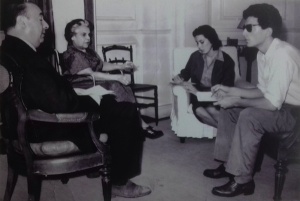Magic in the mists
by Agustín Pico Estrada
“My favourite book by one of my favourite Argentinian authors.” Samanta Schweblin
Land of Smoke is the first English translation, by Jessica Sequeira, of a work by my mother, the recently rediscovered Argentinian writer Sara Gallardo. A story collection originally published in 1977, it is a haunting cornucopia of the strangest fare Southern South America can possibly offer: Andean Sasquatches breeding hybrids with Basque deserters, a stubborn lady ghost who insists on collecting her retirement allowance – much to the dismay of other queueing pensioners, Pampas lycanthropes, cosy suburban homes suddenly drifting away to the high seas. Before Land of Smoke, Gallardo wrote four novels which met with considerable praise from critics and acceptance by the public; she was also a regular contributor to newspapers and weeklies, and some of her best writing is to be found in those shrewd and humorous short pieces, some of which have recently been collected and published in Argentina. After Land of Smoke came the short novel La rosa en el viento (The Rose in the Wind).
If there is such thing as literary genes, Gallardo undoubtedly carried them. On her mother’s side, she descended from General Bartolomé Mitre, Argentina’s first constitutional president in the 1860s. Mitre was not only a prominent statesman but a formidable polymath, who laid the foundations of contemporary Argentine historiography with his massive (and still unchallenged) mythopoeic biographies of the founding fathers of Argentine independence. He also wrote, among many other things, a highly readable rhyming translation of Dante’s Divine Comedy, deep studies of the region’s pre-Columbian past (apart from the mandatory French, he had some Greek and Latin, and was fluent in native languages Guaraní and Quechua), built a valuable library which included Aztec codices, and most notably founded La Nación, still one of the major Argentine newspapers. Gallardo’s maternal great-grandfather was Miguel Cané, a late-nineteenth-century statesman who was also a witty and prolific writer. Her father Guillermo was a historian, and also very much a reading man. Gallardo’s father Ángel was a noted zoologist (ants were his field) who, much to his chagrin, had to leave his beloved studies when he was called to serve his country in several public roles in the early twentieth century. Land of Smoke brilliantly pulls together these strands: a passionate love of nature, an equally passionate love for words.
Gallardo was engaged in the writing of Land of Smoke when Murena died in 1975. Grief-stricken, she carried on with her work. The last story in the collection, ‘Un solitario’ (‘A Loner’) is a poignant tribute.”
Gallardo’s first novel was Enero (January), originally published in 1960. She had recently married Luis Pico Estrada, five years her junior, and already well known as a journalist (he would later become an equally respected screenwriter). Although Enero’s story and writing are very much Gallardo’s, Pico Estrada gave a hand with the structure and final layout. It is the deliberately sparse and understated story of the predicament of a country girl who is pregnant as the result of rape. The careful structure with its taut, elegant prose, fairly creaks and hisses with the overwhelming loneliness of the main character, fifteen-year-old Nefer, who is ultimately forced to marry her rapist. Enero was critically acclaimed; it also met with some unexpected attention from communist sympathisers, who took it to be a ‘socially engaged’ work dealing with the pressures of family and society on the helpless proletariat, and was promptly published in Czechoslovakia and the German Democratic Republic.
Gallardo’s next novel was Pantalones Azules (Blue Jeans). In fact, she had wanted the novel to be published as Blue Jeans, but her Spanish-language publishers did not agree. In it, a student from a well-to-do family, engaged in violent ultra-Catholic right-wing militancy, falls in love with a beautiful and free-spirited (and blue jean-clad) Jewish art student. But he prefers to go back to an arranged marriage with an unlovable girl from his own background, renouncing a path that could have made him free.
 c. 1958. © Sara Gallardo Estate” width=”360″ height=”241″>Perhaps wary of her unwonted role as a progressive social comentator (in a magazine piece, she once wrote: “Please abandon the pernicious habit of asking me to write about current affairs. I do not believe there is such thing as current affairs; and, if they do exist, they are vulgar.”), Gallardo embarked on a new novel of thwarted love, which did not contain anything that could be immediately thought of as political. Los galgos, los galgos (The greyhounds, the greyhounds) was instantly popular in Argentina. But on publication in 1968 Gallardo had second thoughts and was dissatisfied with some sections of the novel (her lengthiest work so far). She did not allow re-publication, and years later produced a considerably stripped-down version called Historia de los galgos (1975) which recalls the sparse style of her earlier work. By then, Gallardo and Pico Estrada had separated, and she had gone on to marry H.A. Murena, a well-known and prolific writer loosely affiliated to the ‘Sur’ group.
c. 1958. © Sara Gallardo Estate” width=”360″ height=”241″>Perhaps wary of her unwonted role as a progressive social comentator (in a magazine piece, she once wrote: “Please abandon the pernicious habit of asking me to write about current affairs. I do not believe there is such thing as current affairs; and, if they do exist, they are vulgar.”), Gallardo embarked on a new novel of thwarted love, which did not contain anything that could be immediately thought of as political. Los galgos, los galgos (The greyhounds, the greyhounds) was instantly popular in Argentina. But on publication in 1968 Gallardo had second thoughts and was dissatisfied with some sections of the novel (her lengthiest work so far). She did not allow re-publication, and years later produced a considerably stripped-down version called Historia de los galgos (1975) which recalls the sparse style of her earlier work. By then, Gallardo and Pico Estrada had separated, and she had gone on to marry H.A. Murena, a well-known and prolific writer loosely affiliated to the ‘Sur’ group.
In the early 1970s, Gallardo travelled to Northern Argentina for several journalistic assignments. Fascinated by what she found there, she made several trips, some of them including lengthy stays in the remote and harsh Chaco region, where she got to meet the dwindling remains of the native population who eked out a miserable living as the lowest rung of the social order in the town of Embarcación, on the Pilcomayo river. It was the inspiration of her next novel, arguably her best and most original work, Eisejuaz. Eisejuaz is related to her earlier work in that it also deals with the derelict and downtrodden of Argentina’s vast rural territories. But it also introduced for the first time a supernatural element, as the titular character is a shaman who acts on the instructions of the God he has known over at the Norwegian Protestant mision, sometimes through spontaneous communication, other times seeking them out through the consumption of traditional hallucinogenic plants.
Gallardo was engaged in the writing of Land of Smoke when Murena died in 1975. Grief-stricken, she carried on with her work. The last story in the collection, ‘Un solitario’ (‘A Loner’) is a poignant tribute to Murena. It is also one of the few realistic stories in the book. The door to the otherworldly had already opened in Eisejuaz; now all sorts of weird and magical creatures and situations trooped through it. Even so, Land of Smoke was above all, and once again, a story about Gallardo’s beloved Argentinian landscape and nature. The overarching theme of the collection is the ungraspable, rootless quality of Southern South America. Inventors of new sciences, criminals, ghosts, dreamers, the migrant flotsam of old Europe, blood-spattered Indian chieftains, sullen gauchos… none of them can really get a hold in the eternally indifferent windswept Andean heights, the chilly mists of the Pampas, the slow brown rivers carrying drifting water-lily islands where man-eating jaguars lurk.
 Sara Gallardo was a celebrated and prize-winning Argentinian writer. Born in Buenos Aires in 1931, her first book was published in 1958, and by the time she died in 1988 she had published novels, short stories, children’s books and essays. Land of Smoke, translated by Jessica Sequeira, is out now from Pushkin Press (£12 paperback).
Sara Gallardo was a celebrated and prize-winning Argentinian writer. Born in Buenos Aires in 1931, her first book was published in 1958, and by the time she died in 1988 she had published novels, short stories, children’s books and essays. Land of Smoke, translated by Jessica Sequeira, is out now from Pushkin Press (£12 paperback).
Read more
Author portrait © Eduardo Comesaña/Revista Confirmado
Jessica Sequeira is an American writer and translator based in Santiago, Chile, who studied at Harvard and the University of Cambridge. She recently translated Liliana Colanzi’s story collection Our Dead World (Dalkey Archive Press, 2017). Land of Smoke is her first translation for Pushkin Press.
jessicasequeira.wordpress.com
@jess_sequeira
Agustín Pico Estrada is a writer and translator. He is the son of Sara Gallardo and Luis Pico Estrada.
Read a story from Land of Smoke:
Sara Gallardo: A secret

